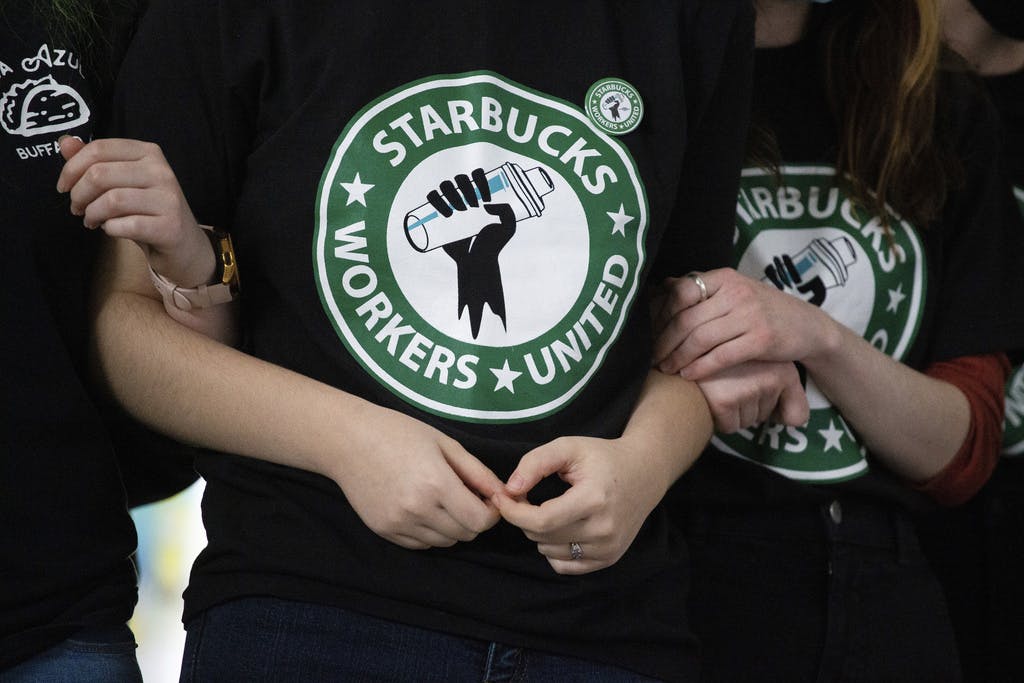The Labor Showdown at Starbucks
The constitutional baristas at the Supreme Court appear to be brewing a bitter cup for the National Labor Relations Board.

The Supreme Court looks poised to scale back the overcaffeinated ambitions of the regulatory state in a dispute between Starbucks and its baristas. The coffee giant recently faced the unwelcome intrusion of a federal agency, the National Labor Relations Board, amid an effort by baristas to unionize. The board jumped into the fray on the side of the employees. It cited “unfair labor practices.” The Nine, in argument today, appears skeptical.
The case centers, in effect, on how much proof the NLRB needs to give to a federal court in order to interfere with a union drive. The board, typically pro-labor, wants more discretion from judges to pounce when it thinks companies aren’t being fair to employees trying to form a union. That’s what happened in the Starbucks quarrel, where the coffee purveyor fired several employees who were starting a union.
The case could have implications for businesses and labor relations nationwide, and not just for coffee shops. The seven Memphis-based employees broke company rules, Starbucks says, in part by “allowing a television crew into the store after hours,” NPR reported, and by going behind the counter of their store, when it was closed, in an effort to publicize their union campaign. Under normal circumstances, that is where the dispute would have ended.
Yet the employees protested to the labor board that their jobs were put on ice because they were trying to form a union. The G-Men leapt to their defense, demanding that Starbucks rehire them. What right does the federal government have to interfere in an employer’s decisions over whom to hire and fire? In this case, it was a New Deal-era law, the National Labor Relations Act of 1935, which tilted the playing field between businesses and their employees.
Also known as the Wagner Act, the labor law was passed after the Supreme Court had voided an earlier, Soviet-style law, the National Industrial Recovery Act. That sought to bring every economic activity in America, including wages and hiring, under federal purview. It was voided by the Supreme Court in the Schechter Brothers poultry case, where the Nine unanimously called the law “an unconstitutional delegation of legislative power.”
Chief Justice Hughes added that letting such regulations stand would mean “virtually no limit to the federal power, and, for all practical purposes, we should have a completely centralized government.” It halted the New Deal’s worst excesses, for a time, but weeks later FDR signed a replacement pro-union law, which is still on the books. Using it, the labor board called Starbucks’ enforcement of its company policies an “unfair labor practice.”
A judge agreed. On what basis? That is where the Supreme Court is being asked to step in. The labor board appears to view federal judges as rubber stamps, obligated to grant its requests under a showing of “reasonable cause,” which critics call a lenient legal standard. This “easy access” to intervention by a judge, the New Civil Liberties Alliance warns, “allows the agency to deprive a party of property rights without the due process of law.”
Starbucks argues that, when weighing an NLRB demand, courts need to meet a stricter standard, including proof that a request is in the public interest. The Nine appear sympathetic to Starbucks. During arguments today, Justice Amy Coney Barrett observed that a district court, in such disputes, “is an independent check” and, by giving stricter scrutiny, “it seems like it should be just doing what district courts do, since it was given the authority to do it.”
The dispute over the NLRB’s powers comes at a time when President Biden is encouraging unions to grow their ranks. A unionization drive just succeeded in an unlikely place, a Volkswagen plant in Tennessee. The labor board is taking aggressive action to aid these organizing efforts, mobilizing the courts when it can. All the more reason for judges, in disputes between businesses and employees, to serve as fair arbiters — saucers for hot tea, as it were.

